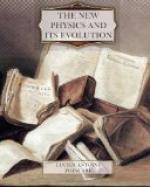But if it were so, we might apparently hope, by experiments in electromagnetism, to obtain absolute motion, and to place in evidence the translation of the earth relatively to the ether. But all the researches attempted by the most ingenious physicists towards this end have always failed, and this tends towards the idea held by many geometricians that these negative results are not due to imperfections in the experiments, but have a deep and general cause. Now Lorentz has endeavoured to find the conditions in which the electromagnetic theory proposed by him might agree with the postulate of the complete impossibility of determining absolute motion. It is necessary, in order to realise this concord, to imagine that a mobile system contracts very slightly in the direction of its translation to a degree proportioned to the square of the ratio of the velocity of transport to that of light. The electrons themselves do not escape this contraction, although the observer, since he participates in the same motion, naturally cannot notice it. Lorentz supposes, besides, that all forces, whatever their origin, are affected by a translation in the same way as electromagnetic forces. M. Langevin and M. H. Poincare have studied this same question and have noted with precision various delicate consequences of it. The singularity of the hypotheses which we are thus led to construct in no way constitutes an argument against the theory of Lorentz; but it has, we must acknowledge, discouraged some of the more timid partisans of this theory.[48]
[Footnote 48: An objection not here noticed has lately been formulated with much frankness by Professor Lorentz himself. It is one of the pillars of his theory that only the negative electrons move when an electric current passes through a metal, and that the positive electrons (if any such there be) remain motionless. Yet in the experiment known as Hall’s, the current is deflected by the magnetic field to one side of the strip in certain metals, and to the opposite side in others. This seems to show that in certain cases the positive electrons move instead of the negative, and Professor Lorentz confesses that up to the present he can find no valid argument against this. See Archives Neerlandaises 1906, parts 1 and 2.—ED.]
Sec. 3. THE MASS OF ELECTRONS
Other conceptions, bolder still, are suggested by the results of certain interesting experiments. The electron affords us the possibility of considering inertia and mass to be no longer a fundamental notion, but a consequence of the electromagnetic phenomena.




